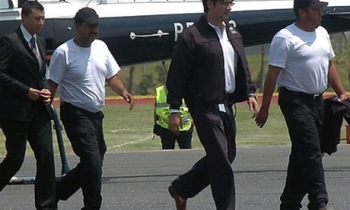When Time Warner, the world's largest media conglomerate, announced a $100 billion merger with AOL five years ago, it was hailed as the perfect marriage between new media and old. Time's then chief executive, Jerry Levin, believed the combined group would carve out a niche in cyberspace that would make it a powerful player as media content moved online.
The synergies between America's largest internet service provider and Time's unparalleled content business - including more than 150 magazines, TV channels like HBO and CNN and the Warner Bros film studios - would allow it to cross-promote, directing users from one medium to the other. One of the world's most prestigious media giants had effectively safeguarded its future at the outset of a brave new digital era.
It didn't quite turn out like that. The merger costs of the world's biggest ever deal spiralled, Levin resigned to be replaced by Dick Parsons, and the market turned against internet stocks. AOL Time Warner's share price tanked, the AOL moniker was quietly dropped, and the critics started sharpening their knives.
Meanwhile, broadband internet access made AOL's clumsy dial-up service seem positively prehistoric. Search engines like Yahoo! and Google became the new online powerhouses, claiming more users and charging companies to advertise on their homepages.
AOL is losing up to two million subscribers a year, but Levin's vision now seems astonishingly prescient. Internet usage has continued to soar and greater capacity is finally allowing consumers to watch content online they could previously only receive in movie theatres or on TV. Along with new devices like PVRs (Personal Video Recorders), new technology is prompting a paradigm shift in the way media is consumed.
Levin's mistake, claim sources at Time Warner, was to strike the right deal at the wrong time, allowing AOL to use its overvalued shares to claim parity in merger talks when internet fever was at its height. If he had waited a few more months, until the dotcom bubble burst, he could have bought it outright at a fraction of the cost, and then waited patiently for the technology to catch up with the hyperbole. But as one company source told The Observer: 'Things are never as good as they seem, but they are rarely as bad either.'
In recent weeks, AOL has become an object of desire for some of the world's biggest media and technology companies. It is being stalked by cable company Comcast (in conjunction with Google), Microsoft and Yahoo!).
They all recognised that its 20 million users represent the last chance to boost their online presence with a single acquisition. Never mind that subscribers are ebbing away, AOL still has enough eyeballs to make it one of the largest destinations in cyberspace. And the huge increase in online advertising, which had long been predicted but proved slow to arrive, has demonstrated the value of the business.
Rapidly growing ad revenues are more than compensating for falling subscriber numbers. In any case, AOL has now made its websites - which include Moviefone, and Mapquest - available free of charge. It is they, rather than the company's dial-up business, that suitors would like to get their hands on.
Powerful as they are, building a popular website is difficult and time-consuming. That's why another media giant, Rupert Murdoch's News Corporation, recently paid millions for a teenage chatroom, My Space, and a gaming site, IGN, giving it instant access to a new generation of media consumers.
The price placed on a stake in AOL, which could be worth up to $10bn according to industry analysts, also reflects its scarcity value and its potential as a cyberspace king-maker. The suitor who strikes a deal will safeguard, or establish, one of the largest online presences, giving them unrivalled clout as internet companies mutate into media giants in their own right, supplying (and in some cases making) music, videos and films to their millions of users.
Convergence is perhaps the most overused buzzword in recent media history, but it is finally taking place, and at breakneck speed. Barely a day passes without a content creator announcing a deal to distribute its products on a new platform; over the internet, on MP3 players, mobile phones or TV.
No one knows where all this will end. Technology companies are becoming broadcasters; earlier this month, Apple unveiled a video iPod. Users can download TV programmes from its iTunes site.
Telecoms companies are also mutating into broadcasters. Last week, BT announced a major push into video-on-demand, pumping TV and films down its broadband network. Ultimately, it seems likely the TV and PC will become a single device.
The question is whether media companies need to be 'vertically integrated' - owning the means of distribution as well as the content they create. Increasingly, the consensus on Wall Street is that they shouldn't, which is one reason MTV-owner Viacom is splitting itself in two. Rupert Murdoch's News Corp, which controls satellite TV operators DirectTV, BSkyB and Sky Italia, might also come under pressure to split.
Corporate raider Carl Icahn, who has built a small stake in Time Warner, is demanding the company does the same by selling its cable division. He has published a long list of complaints, criticising management and demanding their resignation. Many of his gripes have some substance - Time Warner's expensive new head office in New York's Columbia Square is a monument to corporate excess, for example.
But Icahn may have had more chance of persuading investors to back his demands if his campaign had begun earlier, before the frantic internet landgrab pushed up AOL's value. Like Levin, the architect of the original AOL Time Warner deal, Icahn may have got his strategy right, but his timing all wrong.









